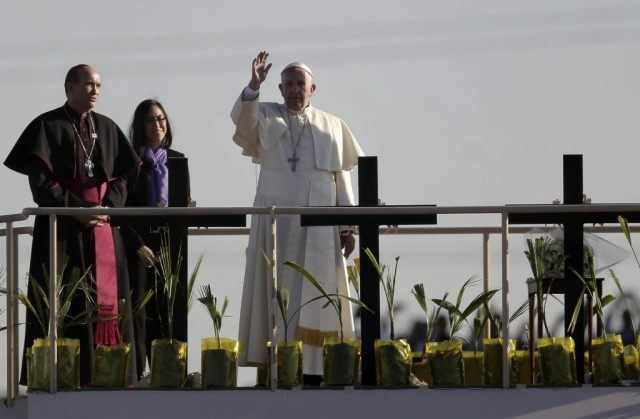Comparing himself to a modern Jonah, who preached repentance and conversion to the wicked of Nineveh, Pope Francis denounced the injustice and violence that compels countless men, women and children to leave their homes in search of a better life.
In his visit to Ciudad Juarez on the last day of his Mexico trip, the Pope intentionally sidestepped political issues such as immigration policy or border controls and focused instead on the unchecked corruption and violence that drives individuals away from their homeland.
The Pope never mentioned the United States once in his passionate address. Instead, he called to mind all those “expelled by poverty and violence, by drug trafficking and criminal organizations.”
Being faced with legal vacuums, he said, “they get caught up in a web that ensnares and always destroys the poorest. Not only do they suffer poverty but they must also endure these forms of violence. Injustice is radicalized in the young; they are ‘cannon fodder,’ persecuted and threatened when they try to flee the spiral of violence and the hell of drugs. Then there are the many women unjustly robbed of their lives.”
The story of many of these people, Francis said, is the result of human trafficking, and entails “a journey laden with grave injustices: the enslaved, the imprisoned and extorted.”
In his homily at Mass before hundreds of thousands, the Pope decried the worldwide “humanitarian crisis” that is behind the migration of thousands of people, whether by train or highway or on foot, “crossing hundreds of kilometers through mountains, deserts and inhospitable zones.”
“The human tragedy that is forced migration is a global phenomenon today, Francis said, and cannot be measured just in numbers and statistics, but must be measured with names, stories and families.
The Pope told the Mexicans that “there is always the possibility of change, we still have time to transform what is destroying us as a people, what is demeaning our humanity.” The time has come, he said, “to weep over injustice, to cry over corruption, to cry over oppression. These are tears that lead to transformation, that soften the heart; they are the tears that purify our gaze and enable us to see the cycle of sin into which very often we have sunk.”
“No more death! No more exploitation! There is still time to change, there is still a way out and a chance, time to implore the mercy of God,” he said.
In his words Wednesday, the Pope reiterated a message he had spoken earlier in the week, reminding Mexicans that the best way to combat the immigration crisis is by making Mexico itself the sort of place where people want to stay and build a home with no need to look elsewhere for opportunity and happiness.
Mexico, he said, should be a place “where there will be no need to emigrate in order to dream, no need to be exploited in order to work, no need to make the despair and poverty of many the opportunism of a few, a land that will not have to mourn men and women, young people and children who are destroyed at the hands of the dealers of death.”
Despite the Pope’s concerted effort to depoliticize his message, others, such as the New York Times, could not resist the temptation to convert the pastoral visit into a stick to beat conservatives.
As the Pope was peacefully celebrating Mass, the NYT editors write, “across the river, was a nation that has frightened itself to the point of panic about foreigners, with help from Republicans running for president.”
“It’s not just Donald Trump, or Ted Cruz, or the rest who would expel immigrants by the millions and deny safety to refugees fleeing war in Syria,” they write.
“So deep is the Republican fear that a once-feasible campaign for immigration reform now lies damaged beyond hope and recognition,” the editors continue. “Even Gov. John Kasich, the candidate of restraint and civility, who rejects mass deportation, said in last week’s debate that unauthorized immigrants must never be given a path to citizenship.”
This was not the Pope’s message, but then again the Times had already outlined the story they wanted to tell, and weren’t about to change it just because an uncooperative pontiff didn’t read their script.
Follow Thomas D. Williams on Twitter Follow @tdwilliamsrome

COMMENTS
Please let us know if you're having issues with commenting.